Introduction
Service dogs have become invaluable companions and assistants to individuals with disabilities. These highly trained animals have the remarkable ability to enhance independence and improve the quality of life for those in need. Service dogs are often tasked with performing specific functions, such as guiding individuals who are visually impaired, alerting the hearing-impaired to important sounds, or assisting individuals with physical disabilities in navigating their environment. They can also play a crucial role in detecting and responding to medical emergencies, providing support to individuals with mental health conditions, or helping those with autism spectrum disorder to cope with their surroundings. This blog post aims to explore the different types of service dogs and their respective roles in aiding individuals with disabilities. By showcasing their incredible capabilities, we hope to shed light on the life-changing impact service dogs have on the lives of those they serve.
Definition and importance of service dogs

Service dogs are highly trained animals that provide invaluable assistance to individuals with disabilities. These specially trained dogs offer a wide range of services, from guiding individuals who are visually impaired to alerting those who are deaf to sounds in their environment. They also assist with mobility limitations, medical conditions, psychiatric needs, and autism.
The importance of service dogs cannot be overstated. They serve as valuable companions and helpers, enabling individuals with disabilities to lead more independent lives. These dogs act as a lifeline, allowing their handlers to navigate the world with increased confidence, mobility, and safety.
Service dogs not only perform essential tasks but also offer emotional support and companionship, thereby enhancing the overall well-being of their handlers. They are trained to anticipate and respond to their handler's needs, providing a sense of security and independence that is often lacking for individuals with disabilities.
The impact of service dogs on the lives of their handlers is remarkable, fostering a sense of empowerment, freedom, and inclusion. Their unwavering loyalty and dedication play a crucial role in improving the quality of life for those with disabilities.
Purpose of the blog post

The purpose of this blog post is to shed light on the significant role that service dogs play in improving the lives of individuals with disabilities. Many people may not fully understand the incredible impact that these trained canines have on the daily lives of those who rely on their assistance. By providing concrete examples and direct explanations throughout this post, readers will gain a deeper understanding of how service dogs assist individuals with various disabilities.
The blog aims to educate readers about the different types of service dogs, such as guide dogs for the visually impaired, hearing dogs for the hearing impaired, mobility assistance dogs, medical alert dogs, psychiatric service dogs, and autism assistance dogs. Each section will explore the specific tasks and support provided by these remarkable animals.
Furthermore, the blog will delve into the training and selection process for service dogs, as well as the benefits they bring to the individuals they assist. Personal stories and testimonials will be shared to demonstrate the life-changing impact that service dogs have on those with disabilities.
Overall, the purpose of this blog post is to raise awareness and appreciation for the vital role that service dogs play in unleashing independence and enhancing the lives of individuals with disabilities.
Types of Service Dogs
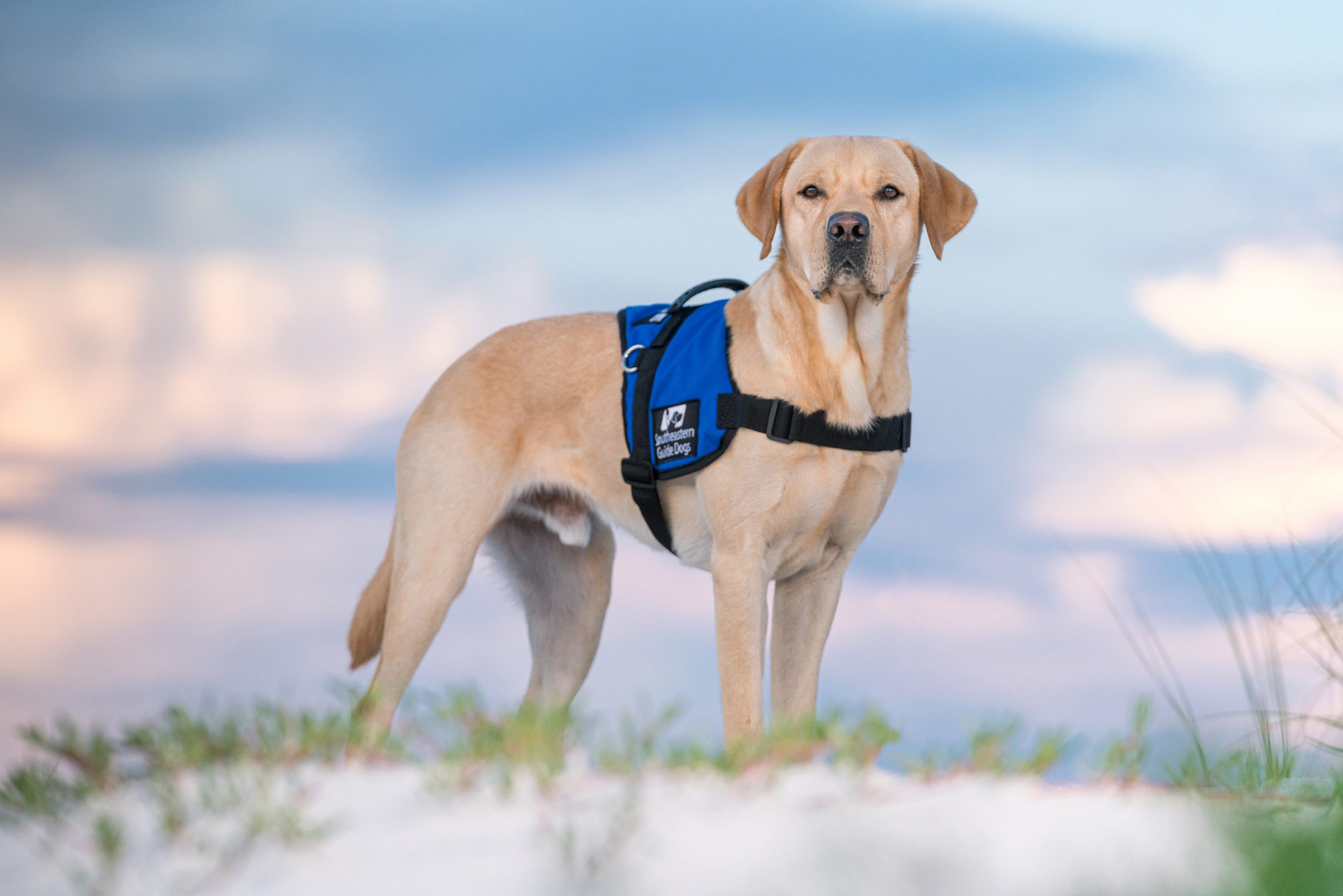
Service dogs play a crucial role in improving the lives of individuals with disabilities. There are different types of service dogs that are specifically trained to assist individuals with various disabilities.
One type of service dog is the guide dog, which is trained to aid individuals who are visually impaired or blind. These dogs provide navigation and help their handlers move safely through their surroundings.
Another type is the hearing dog, which is trained to assist individuals who are deaf or hard of hearing. They are trained to alert their handlers to important sounds, such as the doorbell or a fire alarm.
Mobility assistance dogs are trained to help individuals with physical disabilities navigate their environment. They can perform tasks such as opening doors, retrieving objects, and even providing stability and balance support.
Medical alert dogs are trained to detect and respond to specific medical conditions. For example, they can alert their handlers to seizures or changes in blood sugar levels for individuals with diabetes.
Psychiatric service dogs provide assistance to individuals with mental health conditions. They can offer emotional support, help with anxiety or panic attacks, and provide intervention in stressful situations.
Autism assistance dogs are trained to support individuals with autism spectrum disorder. They can help encourage social interaction, provide emotional regulation support, and offer a sense of security and companionship.
The training and selection process for service dogs is rigorous and extensive. These dogs undergo obedience training to ensure they follow commands and are well-behaved. They are then carefully matched with individuals based on their specific needs and requirements.
Service dogs provide numerous benefits to individuals with disabilities. They enhance independence and mobility, allowing individuals to engage in daily activities with greater ease. They also improve physical and mental well-being by providing companionship and emotional support.
In conclusion, service dogs have a life-changing impact on individuals with disabilities. They provide vital assistance and support, enabling individuals to lead more independent and fulfilling lives. Personal stories and testimonials attest to the valuable role these dogs play in improving the lives of those they serve.
Guide dogs for the visually impaired

Guide dogs are one of the most well-known types of service dogs. These highly trained canines play a crucial role in assisting individuals with visual impairments. Navigating the world can be a daunting task for those who are blind or visually impaired, and guide dogs provide the guidance and support needed to move confidently and independently in their surroundings.
Guide dogs are trained to understand and follow commands from their handlers, enabling them to safely navigate obstacles, cross the street, and find specific destinations. They are often equipped with special harnesses and leashes that allow both the handler and the dog to work together seamlessly.
The bond between a guide dog and their handler is truly remarkable. These dogs are not only reliable partners but also offer emotional support, companionship, and a sense of security. They provide individuals with a newfound sense of freedom and open up a world of possibilities that may have otherwise seemed out of reach.
Guide dogs are a beacon of independence and empowerment for visually impaired individuals, enabling them to live fulfilling lives and pursue their dreams with confidence.
Hearing dogs for the hearing impaired
Hearing dogs play a crucial role in improving the lives of individuals with hearing impairments. These specially trained service dogs are trained to help those who are deaf or hard of hearing navigate their daily lives with greater independence and confidence.
Hearing dogs are trained to alert their handlers to important sounds and signals in their environment. For example, they can alert their handlers to a doorbell ringing, a smoke alarm going off, or someone calling their name. By providing these auditory alerts, hearing dogs enable individuals with hearing impairments to stay connected and aware of their surroundings.
Moreover, hearing dogs also assist their handlers by retrieving items, such as phones or keys, that they may not have heard drop or be out of reach. These dogs are trained to listen for specific sounds and respond accordingly, providing invaluable assistance to individuals with hearing impairments.
By partnering with a hearing dog, individuals with hearing impairments gain a sense of security and independence, knowing that their furry companion is always by their side, ready to help them navigate the audible world.
Mobility Assistance Dogs
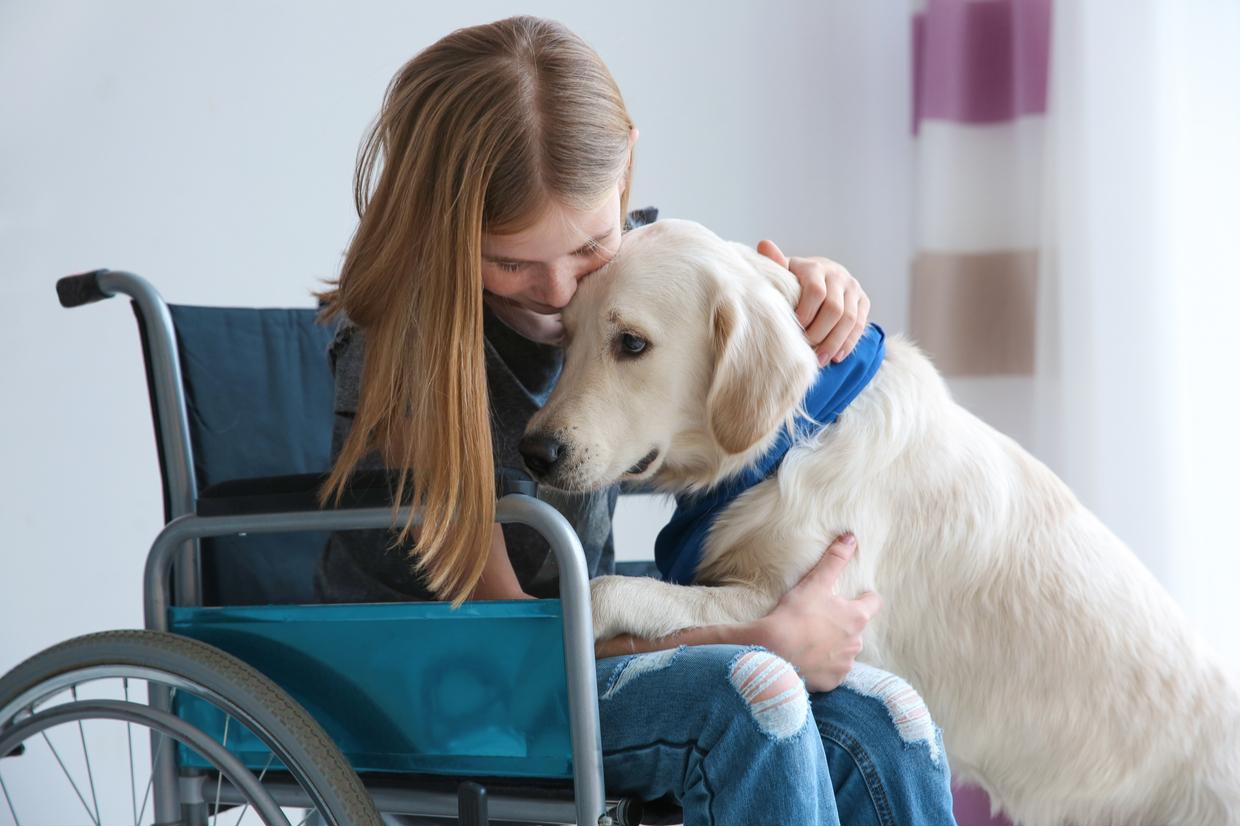
Mobility assistance dogs play a vital role in improving the lives of individuals with physical disabilities. These incredible canines are trained to help their handlers navigate their environment with ease and independence. For those who use wheelchairs or walkers, mobility assistance dogs can be their trusty companions, providing support and assistance.
These specially trained dogs are adept at performing a wide array of tasks to assist their handlers. They can retrieve dropped items, open and close doors, turn lights on and off, and even help with daily tasks like dressing and undressing. With their strong sense of balance, mobility assistance dogs can provide stability and prevent falls, providing a greater sense of safety and security.
The bond between a mobility assistance dog and its handler is truly remarkable. With their unwavering loyalty, these dogs become an essential part of their handler's daily life, enabling them to navigate the world with confidence and independence. The impact that mobility assistance dogs have on the lives of these individuals is immeasurable, as they empower them to live life to the fullest, breaking the barriers imposed by their physical limitations.
Helping individuals with physical disabilities navigate their environment
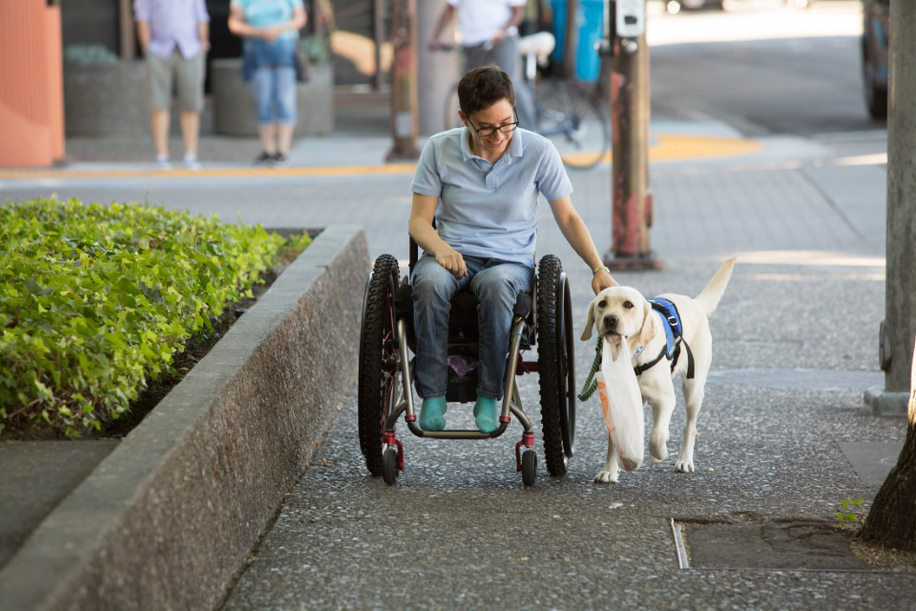
Mobility Assistance Dogs play a vital role in helping individuals with physical disabilities navigate their environment with confidence and independence. These highly trained dogs provide invaluable support and assistance to their handlers, allowing them to overcome barriers and access places that may otherwise be challenging.
For individuals using wheelchairs or mobility aids, mobility assistance dogs are trained to open doors, retrieve objects, and maneuver through crowded spaces. They can also retrieve dropped items and assist with dressing and undressing.
Furthermore, these dogs are trained to navigate various terrains and assist their handlers with balance and stability. They can help individuals with physical disabilities climb stairs, get up from a seated position, and walk more safely.
By providing physical support and assistance, mobility assistance dogs enable their handlers to accomplish daily tasks and participate in activities that may have previously been restricted. They enhance their independence and allow them to confidently engage with the world around them.
Tasks performed by mobility assistance dogs
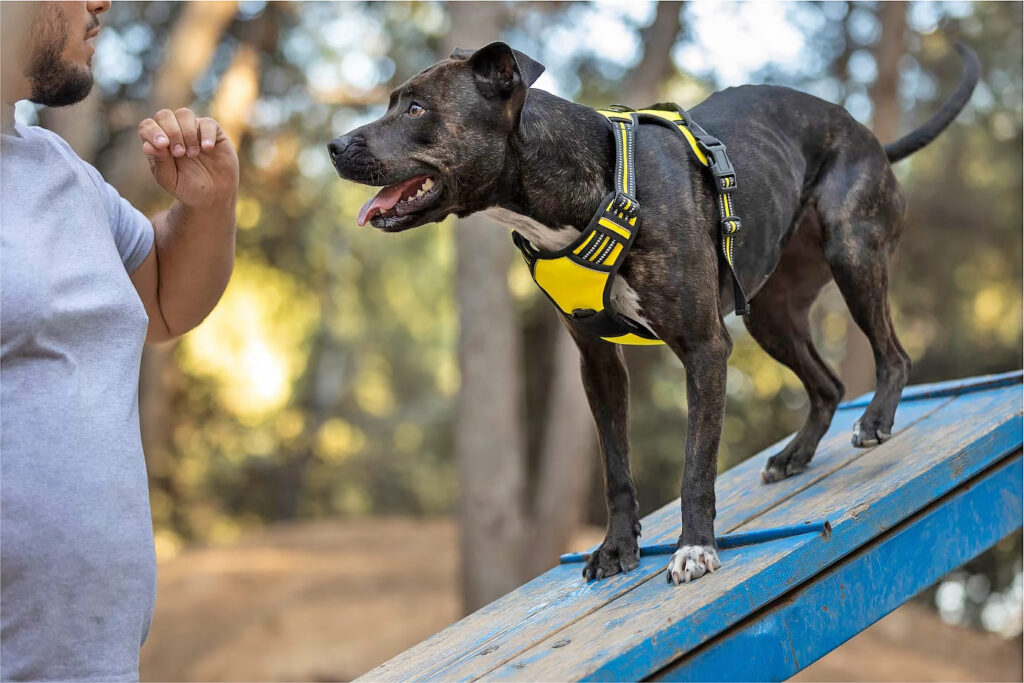
Mobility assistance dogs are highly trained animals that play a crucial role in helping individuals with physical disabilities navigate their environment. These remarkable canines can perform a wide range of tasks that enable their handlers to live more independently and confidently.
One important task that mobility assistance dogs excel at is retrieving objects. For example, if a person in a wheelchair drops an item, the dog can pick it up and place it within their reach. Additionally, these dogs are trained to open doors, both for entering and exiting buildings or rooms. They can also pull wheelchairs, assisting their handlers in moving from one place to another.
Furthermore, mobility assistance dogs are trained to provide stability and support during walking or standing. They can be taught to brace themselves so that the person can lean on them for balance. This simple act greatly enhances the individual's freedom of movement and reduces the risk of falling.
In summary, the tasks performed by mobility assistance dogs are essential for individuals with physical disabilities, empowering them to navigate their surroundings with greater ease and independence.
Medical Alert Dogs

Medical Alert Dogs play a crucial role in the lives of individuals with specific medical conditions. These highly trained service dogs are capable of detecting and responding to medical emergencies, providing invaluable assistance and peace of mind to those in need.
One of the primary roles of Medical Alert Dogs is detecting and responding to seizures. These dogs are trained to recognize the subtle changes in a person's behavior or body odor that may indicate an impending seizure. They can alert their handlers or caregivers, allowing them to take necessary precautions and seek medical assistance if needed.
In addition to detecting seizures, Medical Alert Dogs also play a vital role in helping individuals with diabetes manage their condition. These dogs are trained to detect changes in blood sugar levels by recognizing unique scents that accompany low or high blood sugar. By alerting their handlers to these changes, they can help prevent potentially dangerous situations and allow for prompt medical intervention.
The ability of Medical Alert Dogs to quickly respond to medical emergencies can be life-saving. With their trained senses and unwavering loyalty, these dogs provide individuals with a sense of security and independence, knowing that they have a vigilant companion by their side.
Detecting and responding to seizures
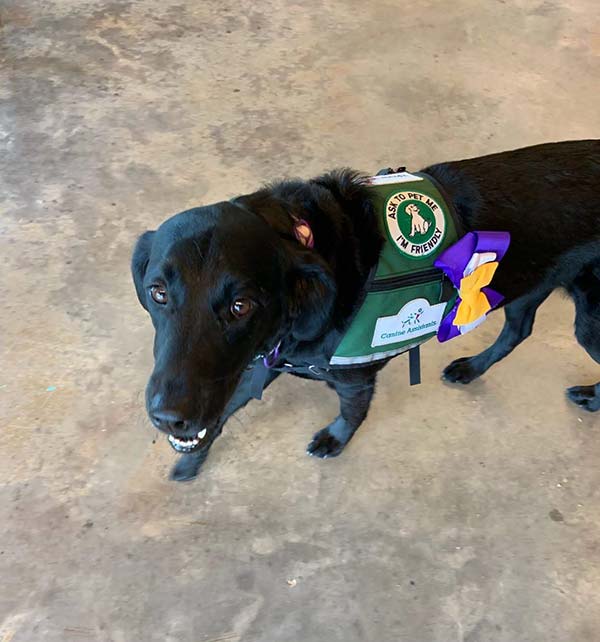
Seizures can be a frightening experience for individuals with epilepsy, but service dogs have proven to be invaluable allies in detecting and responding to these episodes. These specially trained dogs are able to sense subtle changes in their handler's behavior and provide vital assistance during a seizure.
Service dogs are trained to recognize pre-seizure signs, such as changes in smell or behavior, allowing them to alert their handler or those around them to the impending episode. Once a seizure begins, the dog can provide physical support by bracing their body against their handler's, preventing injury and reducing the risk of a fall.
In addition to physical assistance, these remarkable canines can also offer emotional comfort. Many individuals with epilepsy experience anxiety or depression as a result of their condition, and the presence of a service dog can provide a sense of security and reassurance during and after a seizure.
Having a service dog by their side not only enhances the safety and well-being of individuals with epilepsy but also allows them to regain a sense of independence and confidence in their daily lives. Their ability to detect and respond to seizures is truly life-changing, providing peace of mind for both handlers and their loved ones.
Alerting to changes in blood sugar levels for individuals with diabetes

Medical alert dogs play a vital role in the lives of individuals with diabetes by detecting and alerting them to changes in their blood sugar levels. These highly trained service dogs are able to detect the smell of low or high blood sugar levels through their acute sense of smell.
When a diabetic person's blood sugar drops too low or rises too high, their body releases certain chemicals that produce distinct odors. Medical alert dogs are trained to recognize these scents and alert their handler by using specific cues or behaviors, such as nudging or pawing at them.
This early warning allows individuals with diabetes to take immediate action to stabilize their blood sugar levels, preventing potentially dangerous complications such as hypoglycemia or hyperglycemia.
The ability of medical alert dogs to sense changes in blood sugar levels can be a life-saving skill for those with diabetes, providing them with greater independence and peace of mind. These dogs enable individuals to engage in their daily activities with confidence, knowing that they have a vigilant companion by their side to ensure their health and well-being.
Psychiatric Service Dogs

Psychiatric service dogs offer invaluable assistance to individuals with mental health conditions, aiding them in their day-to-day lives and promoting their wellbeing. These remarkable canines are trained to perform various tasks that support their handler's specific needs.
For individuals with conditions like post-traumatic stress disorder (PTSD), psychiatric service dogs provide a sense of security and comfort. They can be trained to create physical barriers, signal to the handler when someone is approaching from behind, or provide grounding techniques during moments of anxiety or panic.
Moreover, psychiatric service dogs offer emotional support and intervention. They are trained to detect signs of distress in their handlers and provide comforting behaviors, such as snuggling or licking, to help alleviate symptoms. Additionally, these dogs can be taught to interrupt harmful behaviors, such as self-harm or repetitive actions, and redirect their handlers' focus.
Psychiatric service dogs play a crucial role in improving the overall quality of life for individuals with mental health conditions, providing them with constant companionship, emotional support, and necessary interventions.
Assisting individuals with mental health conditions

Psychiatric Service Dogs play a valuable role in assisting individuals with mental health conditions. These dogs provide support and intervention to their handlers, helping them manage various mental health challenges. For example, individuals with post-traumatic stress disorder (PTSD) may struggle with anxiety and panic attacks. A psychiatric service dog can be trained to detect signs of distress and offer comfort and grounding techniques to help their handler calm down.
Moreover, these dogs can help individuals with conditions like depression and bipolar disorder by providing emotional support and a sense of stability. They can sense changes in their handler's mood and behavior, alerting them to potential episodes and providing comfort during difficult times. Additionally, psychiatric service dogs can be trained in specific tasks such as interrupting self-harming behaviors or reminding their handlers to take medication.
The presence of a psychiatric service dog can also reduce feelings of isolation and loneliness, as well as provide a sense of security and companionship. These dogs offer nonjudgmental support and unconditional love, which can greatly benefit individuals with mental health conditions.
In conclusion, psychiatric service dogs play a crucial role in assisting individuals with mental health conditions. They provide comfort, emotional support, and specific task-related assistance that can significantly improve the lives of their handlers. The bond between a psychiatric service dog and their handler is truly life-changing.
Providing emotional support and intervention
Psychiatric service dogs play a vital role in providing emotional support and intervention to individuals with mental health conditions. These highly trained dogs are trained to recognize signs of distress and provide comfort and support during times of anxiety, panic attacks, or other emotional episodes.
For individuals with conditions such as post-traumatic stress disorder (PTSD), psychiatric service dogs can offer a sense of security and stability. These dogs are trained to provide a calming presence and help individuals navigate daily challenges that may trigger their symptoms. They can interrupt repetitive behaviors, provide deep pressure therapy, and even assist in creating physical barriers between their handlers and potential threats.
In addition to their physical assistance, psychiatric service dogs also offer companionship and unconditional love. The bond between a service dog and its handler can provide immeasurable emotional support, reducing feelings of loneliness and isolation.
It is important to note that psychiatric service dogs are not therapy dogs or emotional support animals. They undergo rigorous training and are specifically matched with individuals based on their specific needs and conditions.
Through their unwavering support and assistance, psychiatric service dogs empower individuals to lead more fulfilling and independent lives. Their presence can be life-changing for those struggling with mental health conditions.
Autism Assistance Dogs
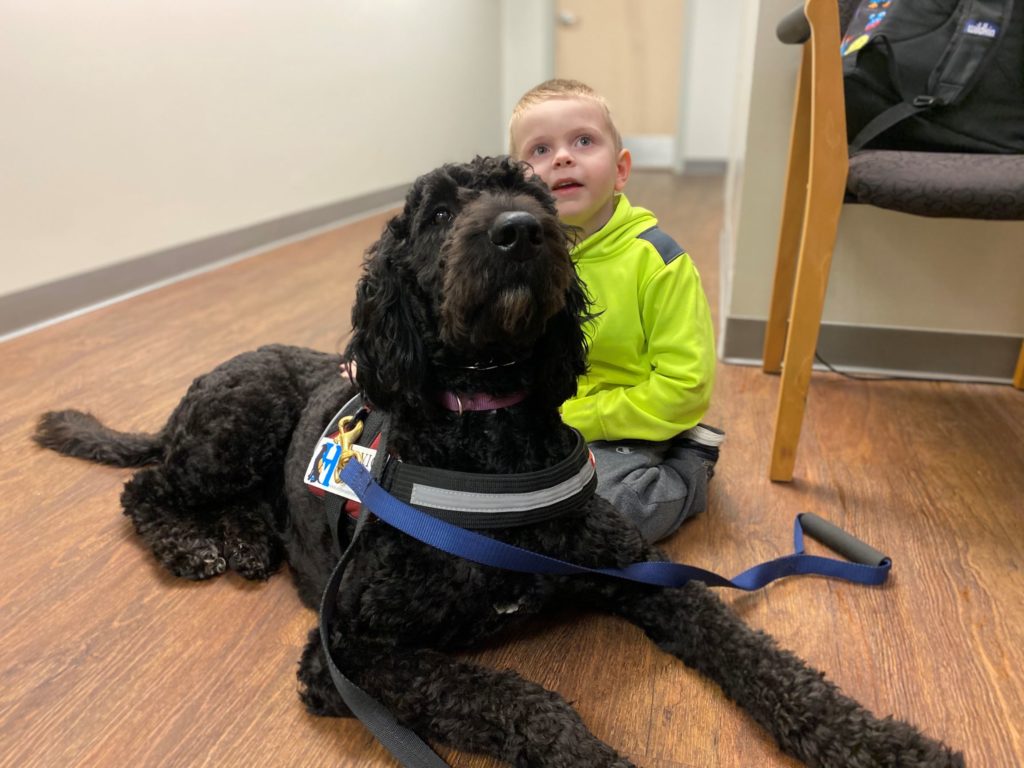
Autism Assistance Dogs play a vital role in supporting individuals with autism spectrum disorder (ASD). These specially trained dogs provide a multitude of benefits that can greatly improve the lives of those with autism.
One of the key areas where autism assistance dogs excel is in encouraging social interaction. Individuals with autism often struggle with social communication and forming relationships, but the presence of these dogs can help create opportunities for engagement and connection. The non-judgmental and unconditional love provided by these dogs can help individuals with autism feel more comfortable and confident in social situations.
Additionally, autism assistance dogs support emotional regulation. Many individuals with autism experience difficulties in managing their emotions and may have meltdowns or sensory overload. These dogs are trained to recognize signs of distress and offer comfort and grounding support. They can provide deep pressure therapy or act as a calming presence to help individuals with autism regulate their emotions and regain a sense of calm.
Overall, autism assistance dogs play a crucial role in the lives of individuals with autism, helping them navigate the challenges of their condition and promoting independence, social interaction, and emotional well-being.
Supporting individuals with autism spectrum disorder

Autism spectrum disorder (ASD) is a developmental disorder that affects communication, social interaction, and behavior. For individuals with ASD, service dogs can play a crucial role in providing support and assistance. These specially trained dogs help individuals navigate the challenges that often accompany autism.
Service dogs for individuals with autism are trained to perform a variety of tasks. For example, they can provide deep pressure or calming techniques during moments of distress or anxiety. They can also perform safety routines, such as preventing the individual from wandering off or alerting to potential dangers.
Moreover, these dogs can provide emotional support and companionship, helping individuals with ASD build confidence and improve their social skills. The presence of a service dog can help reduce feelings of isolation and facilitate interaction with others.
By supporting individuals with autism spectrum disorder, service dogs contribute to their overall well-being and quality of life. Their calming presence and ability to perform specific tasks make them invaluable companions and partners in navigating the challenges of living with ASD.
Encouraging social interaction and emotional regulation

One of the remarkable ways in which service dogs improve the lives of individuals with disabilities is by encouraging social interaction and supporting emotional regulation. For individuals with conditions such as autism spectrum disorder, socializing and navigating social situations can be challenging. Autism assistance dogs play a crucial role in facilitating social interaction by providing a bridge between the individual and others. These dogs can help initiate conversations, reduce anxiety, and serve as a source of comfort in social settings.
Moreover, service dogs contribute to emotional regulation by providing a constant source of support and companionship. They are trained to recognize and respond to emotional cues, offering comfort and reassurance during times of stress or emotional distress. By offering a sense of security and unconditional love, these dogs provide individuals with a reliable source of emotional stability.
The presence of a service dog can also increase social acceptance and reduce stigmatization for individuals with disabilities. The sight of a service dog signals that the person may have a condition or disability, prompting others to be more understanding and accommodating. As a result, service dogs not only enhance the social and emotional well-being of individuals with disabilities, but also contribute to a more inclusive and accepting society.
Training and Selection Process
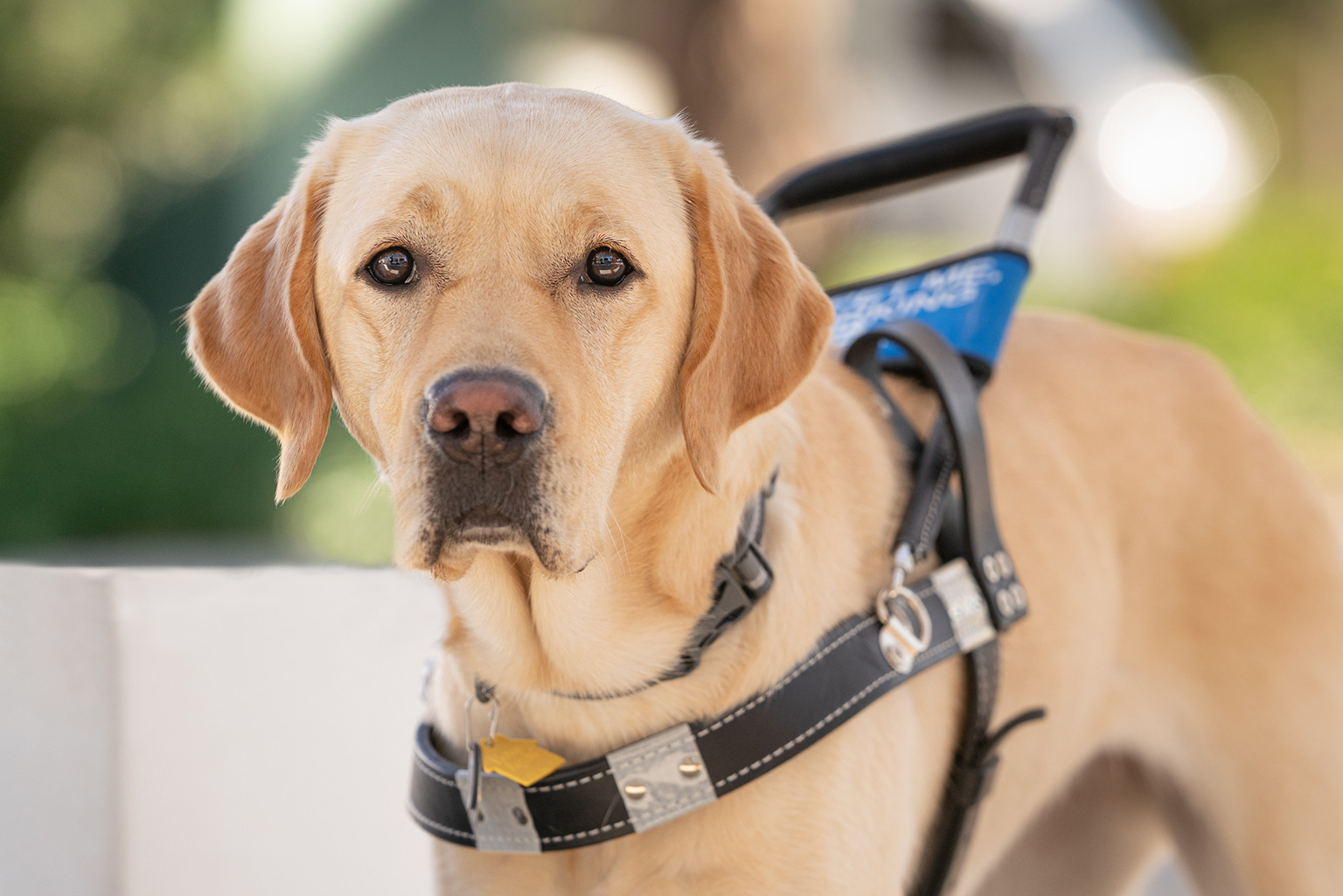
Training and selection of service dogs is a rigorous process that involves specialized training techniques and careful evaluation. These dogs undergo extensive obedience training to ensure they can respond to commands reliably and confidently. They are taught to perform specific tasks based on the needs of individuals with disabilities. Service dogs may be trained to guide individuals with visual impairments, alert to sounds for individuals with hearing impairments, assist with mobility for those with physical disabilities, or provide support for individuals with mental health conditions or autism spectrum disorder.
The selection process for service dogs is equally important. It involves assessing the temperament, health, and suitability of the dog for the specific tasks they will be trained to perform. Trainers carefully evaluate the dog's ability to remain calm and focused in various environments, as well as their willingness to learn and work closely with their potential handler.
Matching the right service dog with the individual is a crucial step. Trainers consider factors such as the person's lifestyle, activity level, and specific needs to ensure a successful partnership. The training and selection process ensures that service dogs are well-prepared to meet the unique requirements of individuals with disabilities, enabling them to live more independent and fulfilling lives.
Obedience training of service dogs

Obedience training is a crucial aspect of preparing service dogs to assist individuals with disabilities. This training is designed to ensure that service dogs are well-behaved, responsive to commands, and able to perform their tasks effectively.
During obedience training, service dogs learn foundational commands such as sit, stay, heel, and come. They are also trained to walk calmly on a leash and to ignore distractions. This training instills discipline and focus in the dogs, enabling them to maintain control in challenging situations.
Professional trainers use positive reinforcement techniques to reward desired behaviors and discourage unwanted behaviors. This positive approach promotes a strong bond between the dog and its handler, enhancing communication and cooperation.
Service dogs undergo extensive obedience training to ensure their reliability and safety. This training period can last several months, during which the dogs receive constant guidance and reinforcement. The dedication and expertise of trainers are essential in preparing service dogs to become invaluable companions for individuals with disabilities.
Matching service dogs with individuals
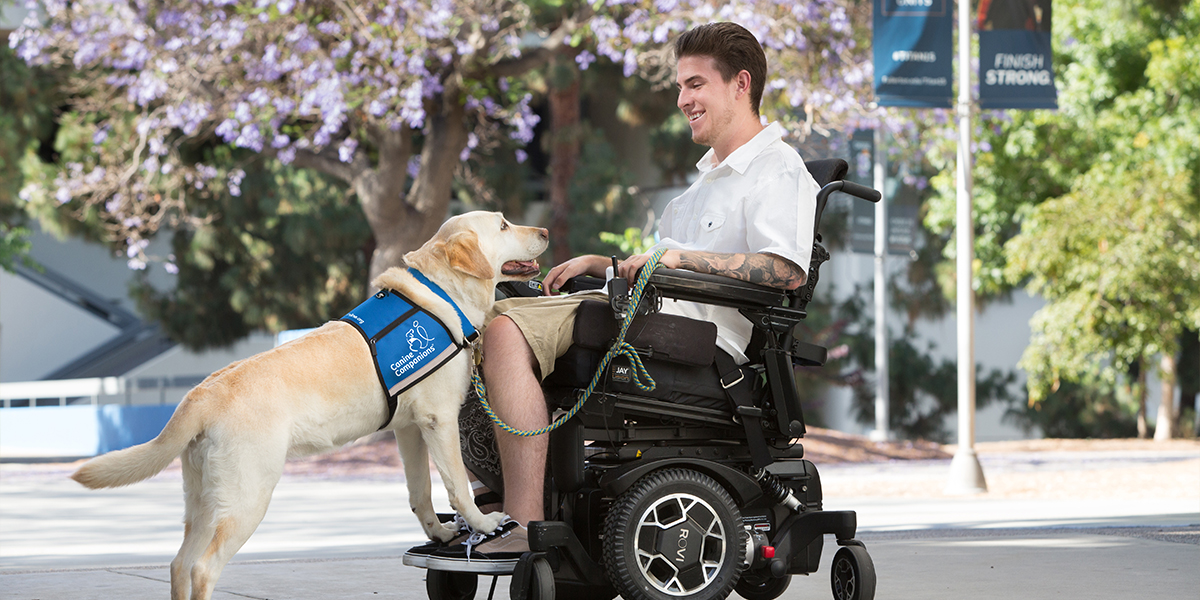
Matching service dogs with individuals is a crucial step in ensuring a successful partnership. This process requires careful consideration of both the individual's needs and the dog's abilities and temperament. Trained professionals, such as service dog trainers or organizations, evaluate the individual's specific requirements, lifestyle, and personal preferences to determine the most suitable dog.
Factors such as the person's disability, physical capabilities, and activity level are taken into account when matching a service dog. For example, a person who is visually impaired may require a dog with advanced guide skills and the ability to navigate complex environments. On the other hand, someone with a mobility impairment may benefit from a dog that can provide steady support and assist with tasks such as opening doors or retrieving items.
The selection process also considers the dog's temperament and behavior. Dogs that are calm, well-behaved, and eager to work make ideal candidates. Additionally, trainers assess the compatibility between the individual and the dog to ensure a harmonious partnership.
Through careful matching, individuals are more likely to receive a service dog that can meet their specific needs and forge a strong bond that fosters independence and enhances their quality of life.
Benefits of Service Dogs

Service dogs provide a multitude of benefits for individuals with disabilities. One of the most significant advantages is the enhancement of independence and mobility. For individuals with visual impairments, guide dogs can safely navigate them through their surroundings, enabling them to travel with confidence. Similarly, hearing dogs alert their owners to important sounds, allowing them to be more aware of their environment.
Service dogs also have a positive impact on physical and mental well-being. Mobility assistance dogs assist individuals with physical disabilities by fetching items, opening doors, and providing stability when walking. This helps improve their overall physical abilities and reduces the risk of falls. Additionally, service dogs offer emotional support and intervention for individuals with psychiatric conditions, reducing anxiety and providing comfort during difficult times.
The benefits of service dogs extend to individuals with autism spectrum disorder as well. These dogs provide companionship and encourage social interaction, helping individuals build relationships and improve communication skills. Furthermore, the presence of a service dog can aid in emotional regulation, providing a calming and comforting influence.
Overall, service dogs play a crucial role in improving the lives of individuals with disabilities, offering support, independence, and a sense of security. Their unwavering dedication and assistance truly make a difference in the daily lives of those they serve.
Enhancing independence and mobility

Service dogs play a crucial role in enhancing independence and mobility for individuals with disabilities. These specially trained companions provide support and assistance to their handlers, allowing them to navigate the world with increased freedom.
For individuals with physical disabilities, mobility assistance dogs are trained to perform tasks that aid in mobility. They can retrieve items, open doors, and help with balance and stability, enabling individuals to move more easily and independently. These dogs are expertly trained to understand and respond to their handlers' needs, providing a sense of empowerment and autonomy.
Additionally, service dogs can help individuals with disabilities navigate public spaces and overcome daily challenges. They can assist in crossing streets, navigate crowded areas, and provide a sense of safety and security. This newfound independence allows individuals to participate more fully in society, engage in daily activities, and pursue their goals and aspirations.
The bond between a service dog and their handler is one of trust and partnership. Together, they form a team that can conquer any obstacle, making the seemingly impossible possible. By enhancing independence and mobility, service dogs truly transform the lives of individuals with disabilities, granting them the freedom to live life to the fullest.
Improving physical and mental well-being
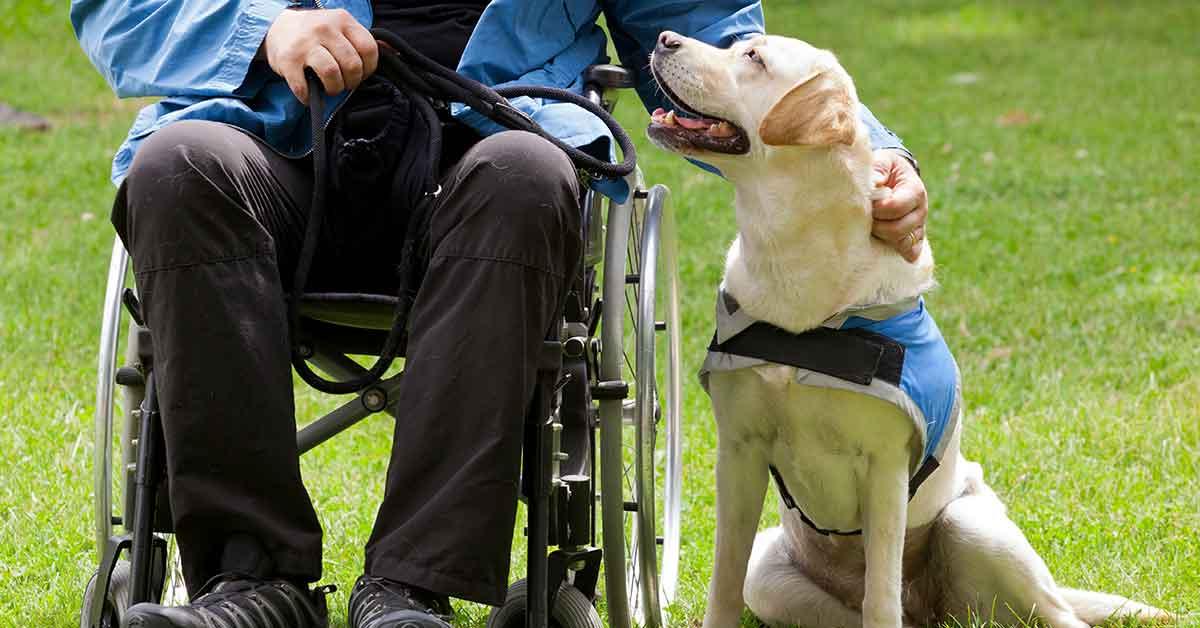
Service dogs not only provide assistance with various tasks, but they also have a profound impact on the physical and mental well-being of individuals with disabilities. The presence of a trained service dog can greatly improve the overall quality of life for these individuals.
Physically, service dogs help individuals with disabilities by providing support during mobility tasks. Whether it's guiding someone with visual impairments, alerting those with hearing impairments to sounds, or assisting individuals with physical disabilities in navigating their environment, service dogs offer a sense of freedom and independence that might not otherwise be possible.
Mentally, service dogs offer emotional support and intervention. They can detect signs of anxiety, panic attacks, or other mental health issues and provide comfort to their handlers. The constant companionship of a well-trained service dog can also help alleviate feelings of loneliness and isolation that individuals with disabilities may experience.
The bond between a service dog and its handler is truly remarkable, and the positive impact on the individual's physical and mental well-being cannot be overstated. Service dogs are not just great companions, but also powerful allies in helping individuals with disabilities lead fulfilling lives.
Conclusion

In conclusion, service dogs play a vital role in improving the lives of individuals with disabilities. These highly trained canines provide invaluable assistance and support, allowing their handlers to lead more independent and fulfilling lives.
The diverse types of service dogs cater to different disabilities. Guide dogs aid the visually impaired in navigating obstacles, while hearing dogs alert the hearing impaired to important sounds. Mobility assistance dogs help individuals with physical disabilities by assisting them in maneuvering their environment. Medical alert dogs are trained to detect and respond to specific medical conditions such as seizures or changes in blood sugar levels. Psychiatric service dogs offer support to individuals with mental health conditions, providing emotional support and intervention. Autism assistance dogs assist individuals with autism spectrum disorder in social interaction and emotional regulation.
The training and selection process for service dogs ensures their obedience and compatibility with their handlers. This careful matching process ensures a strong bond and effective teamwork between the dog and individual.
The benefits of having a service dog are extensive. They enhance independence and mobility, improve physical and mental well-being, and provide a constant source of companionship and emotional support. Countless personal stories and testimonials highlight the life-changing impact of service dogs on their handlers.
In recognition of their remarkable abilities, service dogs deserve our admiration and support. Their tireless dedication and unwavering loyalty make a world of difference to individuals with disabilities, empowering them to overcome challenges and embrace a more independent and fulfilling life.
Personal stories and testimonials
Personal stories and testimonials from individuals who have experienced the life-changing impact of service dogs illustrate the profound difference these companions can make. For instance, Michelle, who is blind, shares how her guide dog, Max, has completely transformed her daily life. With Max by her side, Michelle can navigate busy streets with confidence and independence, allowing her to pursue her passions and take on new adventures.
Similarly, John, who has diabetes, credits his medical alert dog, Bella, with saving his life on numerous occasions by alerting him to dangerous drops in his blood sugar levels. Bella's unwavering commitment to her training has given John a renewed sense of security and peace of mind, empowering him to live his life to the fullest.
These personal stories and testimonials serve as powerful reminders of the essential role that service dogs play in enhancing the lives of individuals with disabilities. Their unwavering loyalty, dedication, and impeccable training enable them to become invaluable companions and sources of support for those who need them most.
Recognizing the life-changing impact of service dogs

Service dogs have a profound and life-changing impact on individuals with disabilities. Through their specialized training and unwavering dedication, these dogs provide invaluable support, independence, and companionship. The impact of service dogs is evident in the personal stories and testimonials of those who have experienced their incredible abilities.
For individuals with visual impairments, guide dogs provide a newfound sense of freedom and confidence, allowing them to navigate their surroundings safely. Hearing dogs become the ears for those who are hearing impaired, alerting them to important sounds and enhancing their communication.
For individuals with physical disabilities, mobility assistance dogs are a constant source of assistance, helping them with tasks such as opening doors, retrieving objects, and balancing while walking. These dogs not only increase independence but also provide a sense of security and companionship.
Medical alert dogs play a vital role in detecting seizures and alerting individuals to impending episodes, allowing them to seek safety and medical attention. They also play a key role in managing diabetes by sensing changes in blood sugar levels.
Psychiatric service dogs provide invaluable support to individuals with mental health conditions, helping them in maintaining emotional stability, reducing anxiety, and assisting in daily tasks. Autism assistance dogs are specially trained to support individuals on the autism spectrum, promoting social interaction and offering comfort during challenging situations.
The training and selection process for service dogs is rigorous, ensuring that each dog is well-suited to their individual's needs. These dogs undergo extensive obedience training and are carefully matched with individuals based on their requirements and lifestyle.
The benefits of having a service dog are immense. They enhance independence and mobility, enabling individuals to live more fulfilling and active lives. Additionally, the presence of a service dog can improve physical and mental well-being, offering companionship, reducing stress, and providing emotional support.
Personal stories and testimonials from individuals who have experienced the life-changing impact of service dogs are a testament to the incredible bond and partnership between humans and their canine companions. These stories highlight the immense difference that service dogs make in the lives of individuals with disabilities, enabling them to overcome challenges, pursue their goals, and live with a greater sense of confidence and joy.
In conclusion, service dogs have a profound impact on the lives of individuals with disabilities. They provide support, independence, and companionship, enabling individuals to navigate their world more confidently. The incredible abilities of service dogs, coupled with their unwavering loyalty and dedication, make them indispensable companions and life-changers for those in need. It is essential to recognize and celebrate the life-changing impact of service dogs, as they truly make a difference in the lives of individuals with disabilities.




0 Comments